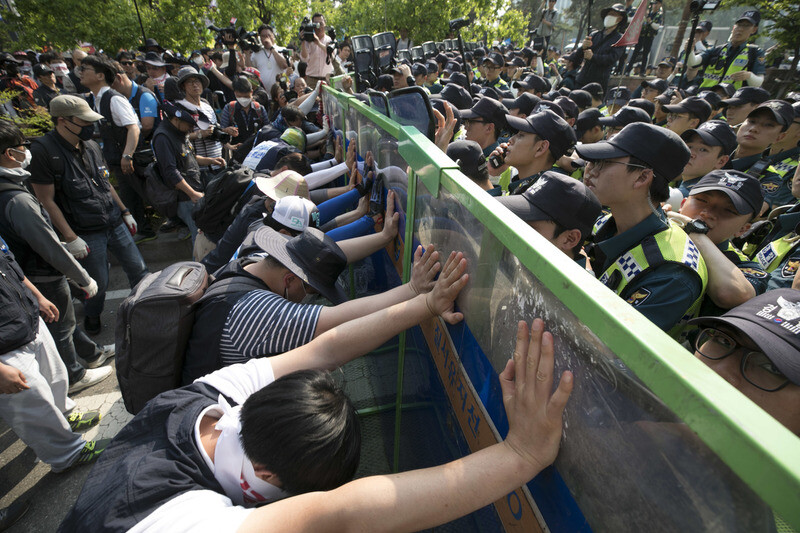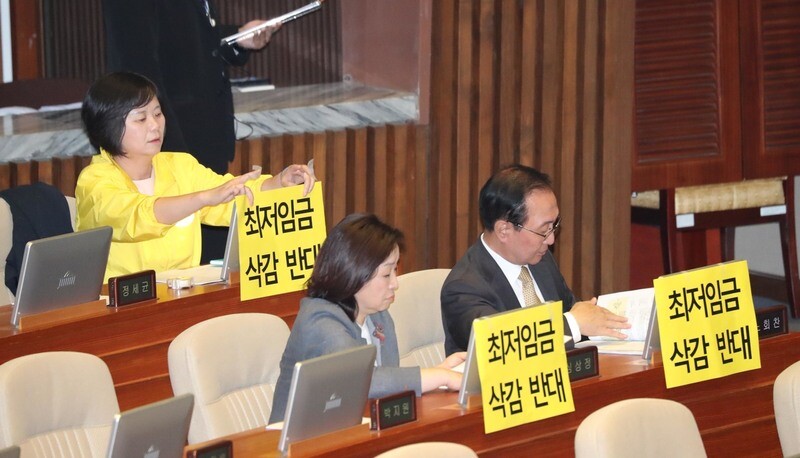hankyoreh
Links to other country sites 다른 나라 사이트 링크
National Assembly passes amendment adding bonuses and benefits to Minimum Wage Act

An amendment to the Minimum Wage Act including regular bonuses paid more than once a month and benefits such as food, transportation, and lodging expenses into the scope of the minimum wage was passed in a regular session of the National Assembly on the afternoon of May 28.
While the amendment means a large expansion in the scope of the minimum wage 30 years after the system’s 1988 enactment, intense objections from the labor world suggest future discussions on the issue will remain deadlocked for some time.
At a regular session on May 28, the National Assembly voted to approve the Minimum Wage Act amendment. With the completion of procedures for the amendment’s passage, the minimum wage used as a standard for determining compliance with the act as of next year will include various new wage-related items including regular bonuses paid once or more a month and benefits such as food and transportation allowances.
While the issue of including regular bonuses had been addressed in internal discussions by the Minimum Wage Commission, the scope was broadened to include benefits during ruling and opposition party discussions in the National Assembly Environment and Labor Committee.

The outcry from the labor world has been intense. The Korean Confederation of Trade Unions (KCTU) held a Seoul-area demonstration before the National Assembly with around 5,000 participants that day, as well as general strike rallies in 13 other cities around South Korea to call for an “end to discussions on changing the minimum wage for the worse.”
The Federation of Korean Trade Unions (FKTU) declared plans to submit a constitutional appeal. While the amendment reportedly included “low-wage worker safeguards” preventing the inclusion of certain percentages of regular bonuses and benefits when calculating the minimum wage, the labor world argues the wage structure is such that workers may experience negative effects anyway.
Another source of controversy is the amendment’s inclusion of terms seen as violating the principle of “unfavorable changes to employment rules.” According to the amendment, the consent of a majority of labor union members or workers is not necessary when changing employment rules to pay wages on a monthly basis without variations in the total amount rather than on regular cycles exceeding one month.
“The issue here is that they are viewing this as not being an ‘unfavorable change’ based on the state’s policy determination,” said Korea Labor Institute research fellow Kim Ki-sun.
Possibly serious negative effects at companies without unions or with weak unions
“There could be serious negative effects at companies without unions or with weak unions,” Kim predicted.
The intense outcry from the labor world could spell trouble for the Minimum Wage Commission’s review of next year’s minimum wage, which is scheduled to take place in one month’s time. Labor world members plan to declare a boycott of societal dialogue and resign from the commission to protest the broadening of the calculation scope.
“Inclusion of regular bonuses could be agreed upon in connection with ordinary wages, but the inclusion of benefits on top of that weakens the basic purpose of the system, which is to improve low-wage conditions,” said an expert speaking on condition of anonymity.
“The enabling of unfavorable changes to employment rules in particular is hard to comprehend in light of the [Moon Jae-in] administration’s aims in terms of a ‘society that respects labor,’” the expert said.
At the same time, the likelihood of the minimum wage increasing substantially next year as it did in 2018 appears larger. With the broader calculation scope reducing the real rate of increase, the labor world now has a rationale for demanding a large hike.
“They’ve changed it from a hard landing to a soft landing,” said KLI research fellow Oh Kye-taek.
“This seems like a preliminary move to win concessions from the business community in discussions on the minimum wage,” Oh suggested.
“It could be a basis for them to approach the minimum wage review by telling the business world, ‘Now it’s your turn to show good faith.’”
The Minimum Wage Commission is planning visits and conferences with companies in Busan, Incheon, and Iksan, North Jeolla Province, through June 5. The main discussion is take place over the course of six plenary session meetings between June 14 and 28.
By Park Ki-yong and Lee Ji-hae, staff reporters
Please direct comments or questions to [english@hani.co.kr]

Editorial・opinion
![[Column] Park Geun-hye déjà vu in Yoon Suk-yeol [Column] Park Geun-hye déjà vu in Yoon Suk-yeol](https://flexible.img.hani.co.kr/flexible/normal/500/300/imgdb/original/2024/0424/651713945113788.jpg) [Column] Park Geun-hye déjà vu in Yoon Suk-yeol
[Column] Park Geun-hye déjà vu in Yoon Suk-yeol![[Editorial] New weight of N. Korea’s nuclear threats makes dialogue all the more urgent [Editorial] New weight of N. Korea’s nuclear threats makes dialogue all the more urgent](https://flexible.img.hani.co.kr/flexible/normal/500/300/imgdb/original/2024/0424/7317139454662664.jpg) [Editorial] New weight of N. Korea’s nuclear threats makes dialogue all the more urgent
[Editorial] New weight of N. Korea’s nuclear threats makes dialogue all the more urgent- [Guest essay] The real reason Korea’s new right wants to dub Rhee a founding father
- [Column] ‘Choson’: Is it time we start referring to N. Korea in its own terms?
- [Editorial] Japan’s rewriting of history with Korea has gone too far
- [Column] The president’s questionable capacity for dialogue
- [Column] Are chaebol firms just pizza pies for families to divvy up as they please?
- [Column] Has Korea, too, crossed the Rubicon on China?
- [Correspondent’s column] In Japan’s alliance with US, echoes of its past alliances with UK
- [Editorial] Does Yoon think the Korean public is wrong?
Most viewed articles
- 1‘We must say no’: Seoul defense chief on Korean, USFK involvement in hypothetical Taiwan crisis
- 2‘Weddingflation’ breaks the bank for Korean couples-to-be
- 3[Reportage] On US campuses, student risk arrest as they call for divestment from Israel
- 4[Column] Park Geun-hye déjà vu in Yoon Suk-yeol
- 5Amnesty notes ‘erosion’ of freedom of expression in Korea in annual human rights report
- 6Korea sees more deaths than births for 52nd consecutive month in February
- 7N. Korean delegation’s trip to Iran shows how Pyongyang is leveraging ties with Moscow
- 8Will NewJeans end up collateral damage in internal feud at K-pop juggernaut Hybe?
- 9[Guest essay] The real reason Korea’s new right wants to dub Rhee a founding father
- 10N. Korean hackers breached 10 defense contractors in South for months, police say